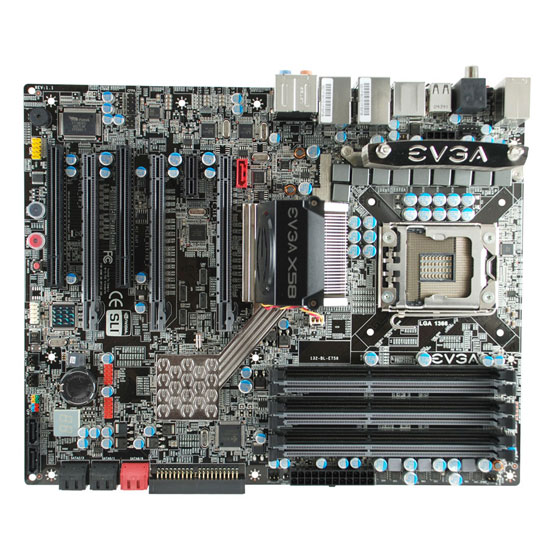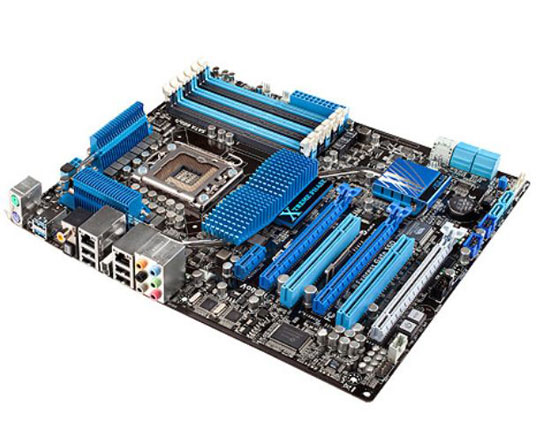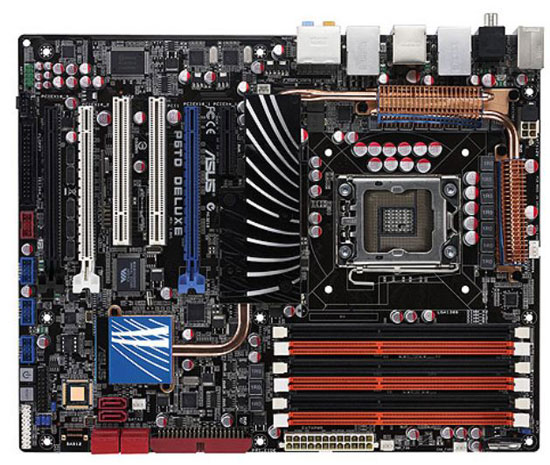Loyd's New Year - A Trio of Problem Systems
by Loyd Case on January 13, 2010 12:00 AM EST- Posted in
- Systems
The Slowly Dying Motherboard
My production system runs a Core i7 965 and 12GB of OCZ DDR3-1600 memory. The 965 clocks at 3.33GHz, and the memory runs at 1333MHz. In either case, it’s not really much of an overclock. The X58 chipset and Core i7 socket 1366 CPUs are rated at DDR3-1066 speeds officially. So technically, the memory is being overclocked.
The system was based on an eVGA X58 SLI motherboard – one of the early versions that shipped. I’d updated the BIOS as new versions came out.

Recently, I’d been having a weird series of glitches. My USB ports would stop working. Once every couple of days, I’d lose network connectivity. My audio would mysteriously stop working, even though I’d see audio activity in any media player, and the speakers seemed to be behaving correctly.
If finally occurred to me that maybe my I/O controller hub was slowly failing, or had developed an intermittent hiccup that created these seemingly unrelated issues.
So I decided to upgrade my motherboard.
My general philosophy when it comes to building the systems I actually use for productive work and personal gaming is to be somewhat conservative – if I can. Go with solutions that seem reliable and robust. I’d waited to upgrade my own system to Core i7 until I’d tested a slew of X58 boards, and the eVGA board had seemed stable. In fact, it had been running problem-free for months.
So naturally I ignored my own inclinations and bought a brand spanking new Asus P6X58D, which sported a discrete NEC USB 3.0 controller and a Marvell SATA 6gbps disc controller.

The board arrived, and seemed to install normally. Windows enumerated all the devices properly, and rebooted as expected. I installed the new drivers from the Asus DVD and rebooted.
Then a new symptom developed: after a warm boot, the fan on the Radeon HD 5870 would spin up to maximum speed and stay there. The sound was almost deafening. When this would occur, the system wouldn’t POST. Only shutting down the power supply and waiting a couple of minutes would allow for a normal boot.
Whiskey. Tango. Foxtrot.
After trying a variety of things – different CPUs, swapping in different memory, upgrading the BIOS (from 0201 to 0402) and even swapping in a different AMD graphics card, nothing changed. So I gave up. I headed out to my local friendly white box shop (Central Computer in San Jose), I picked up another Asus board: a P6TD Deluxe. The P6TD is a second (third?) generation X58 board from Asus, with more copper and 16-phase power. It’s really a souped up P6T board, but refined over the original design.

Swapped back in my original components, fired up the system and held my breath.
The system POSTed normally. Since then, I’ve run a number of applications, including some fairly system intensive games, and it’s all behaving as it should.
Lesson learned: when you need a working system for, well, work, then don’t go with the bleeding edge. I knew that already, but every now and then, I have to re-learn it. I suppose it’s my eternally optimistic nature, but I tend to believe that newer is often better. Alas, it’s not always the case.










109 Comments
View All Comments
nubie - Wednesday, January 13, 2010 - link
+1 on:"Isnt it much simpler to go to newegg and order the components with the most reviews and the highest ratings? I've never had any problems doing it that way."
-1 on " Anyone who has bought anything to do with DDR3 has wasted their money."
Performance isn't just measured in max memory throughput, (which triple-channel DDR3 certainly wins). But also in power consumption and future speed improvements.
I don't know what this DDR3 "waste of money" talk is. If you personally don't see a need to upgrade, then don't. Many use AM3 chips with DDR2 and have adequate performance. Many also use Core i7/i5/i3 systems and enjoy increased performance.
You can't complain about upgrades, after all DDR2 started at 400mhz, not a real upgrade from DDR at 400mhz, but look where it ended: with performance rivaling introductory DDR3. If we don't move forward when will it improve?
Ratinator - Wednesday, January 13, 2010 - link
I am having the exact same problem, however I am using OCZ-1600 RAM. The difference however is I have yet to upgrade the BIOS to the latest release. I haven't had time to flash the BIOS yet and here is what I am experiencing: At 1600MHz, it doesn't recognize all the RAM properly. At 1333 it does. I also have the same problem with hangs when recovering from sleep mode. If I remember correctly the most recent BIOS updates do provide better RAM compatibility and because you updated your BIOS before putting in the OCZ RAM, you may have gotten lucky.Spacecomber - Wednesday, January 13, 2010 - link
Enjoyed the article. I just thought that I would mention that I find it usually worthwhile to run a memory testing program, such as MemTest, for an extended period of time when I'm faced with a crash-prone computer. Often this will pick up the memory errors contributing to this problem. (You often can narrow down your finding to a specific module by running MemTest on each one individually, as well.) Most manufacturers have warranties on their memory such that they will accept the return of the faulty memory for a replacement (and they will accept your report of the MemTest results as evidence that the module is faulty).chusteczka - Wednesday, January 13, 2010 - link
Memtest errors are not exclusively related only to memory issues. I have often tracked memtest errors to a faulty PSU connection to the motherboard and unstable CPU settings in the BIOS. It is best to think of memtest errors as being system errors.yyrkoon - Thursday, January 14, 2010 - link
You will know when memtest will find your ram faulty. That is if you're any sort of competent with troubleshooting computer systems. Your universal statement is very much untrue. There is a reason why every competent PC repair person uses this test application.ImSpartacus - Wednesday, January 13, 2010 - link
Ok, call me young and feeble, but I cannot stand seeing an "extreme" CPU that isn't overclocked pretty hard. And it was done not once, but twice! I'll forgive the i7 860, as it has Bloomfield over it and doesn't cost a grand.You could have saved yourself $500+ on your daughter's machine by getting a Q6600 and modestly overclocking it to 3.00GHz (333x9).
And an i7 965? Really now? Do I even need to tell you how much money was wasted on that gem?
I would love to be in a financial situation in which I could buy a product that screams "4.0GHz" over and over again, but instead leave it stock to taunt my less fortunate brethren.
strikeback03 - Wednesday, January 13, 2010 - link
We occasionally buy high-end CPUs and leave them stock in our lab systems, because we need something fast and don't have the time to spend tweaking an OCed system. Also, he might not have bought all those CPUs at retail.cjb110 - Wednesday, January 13, 2010 - link
I think the post highlights a serious issue within the industry. Wishy-Washy standards! I shouldn't have to 'hope my supplier has a decent returns policy'If I put DDR3-1600 into a DDR3-1600 slot it should work whatever the rest of the system. Why didn't the memory work? Was it power? timings? what? what did jedec or whoever forget to nail down in the spec, that allowed these inconsistanties?
Its not just memory, I can't think of a single tech related standard that actually is a true standard.
I've had my NAS drive reject a SATA disk, because the manufacture doesn't support a certain command...wtf? I wasn't sold a SATAish disk, or a SATA (apart from feature x) disk, there was nothing on the box or anywhere at the point of sale to tell a consumer this.
Similarly most bluetooth phones, aren't. Or at least they actually only support an extremely limited part of bluetooth functionality (often just headset support). But the spec sheets says BT ADAP 2.1 or sommit equally vauge...nothing about not supporting remote sim access, file transfer or obex etc
strikeback03 - Wednesday, January 13, 2010 - link
I don't know about bluetooth on phones in general, but on Verizon in particular they limit what the bluetooth can do, apparently out of fear of theft of their ringtones or some other crap.glockjs - Wednesday, January 13, 2010 - link
it's refreshing to read an article like this tbh. shows the reality we go through and forget when we start tinkering with hardware haha.i just wanna say it makes me sad inside that your teenage daughter has a rig that crushes mine to play flash games and check myspace :( and you say "older" 4870 when i proudly rock a 3870 haha.
it seems to me that you use nothing but quality parts and still had a hardware issue with the ram. the fanboi in me jumped out when you were mentioning the brands ocz...corsair...as i thought to myself "why the f didn't he say g.skill". tbh the rigs i've built in the past years i seem to have zero issues with g.skill...just a thought.